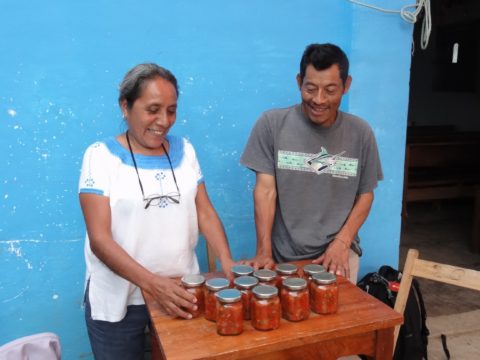Re-thinking Earth Day blowout sales wrapped up in one big green recycled bow, by OEH Intern Carmen Wadleigh
Selling salsa at a farmers’ market in Chiapas
Community gardening in Chiapas
With April comes Earth Day and a myriad of advertising slogans urging us to shop our way to becoming greener. Walmart boasts Earth friendly practices by advertising a recycled t-shirt. My favorite clothing store hosted a $1 sale that they donate to an animal welfare non-profit, that I cannot deny made me perk my ears up. Yet when you step back from the advertisements about recycled wrappers and Earth Day blowouts, you wonder how far we have deviated from the original message.
Originally April 22nd was intended to serve as a teach in and community gathering that opposed big corporations and their irresponsible extraction of natural resources. Now with our tendency to commercialize, Earth Day too has fallen victim to greenwashing. Commemorating the holiday with consumption just reaffirms our exploitative relationship with the environment all wrapped up in a big green recycled bow.
There is validity in working within a system towards solution, even when the problems you are trying to address are caused by the same system. It would be nearly impossible to imagine solving the issues that capitalism has produced by completely rejecting it. Countering these massive problems that face the entire population take collective effort, and completely rejecting a system that has been normalized into our lives would simply not be effective at this juncture. Nevertheless, it is beneficial and necessary to explore alternatives modes of thinking. It is possible to celebrate Earth Day or be more environmentally friendly without purchasing one single item made from recycled materials! One perspective that can teach us about a path towards a greener world is the indigenous concept of buen vivir, or living well.
Largely based out of Andean indigenous tradition of suwak causay, the concept of living well is central to the traditional Cosmos visions of many American Indigenous Peoples. Living well informs not only an alternative to modern ideas of development, but also offers a different ethical compass and worldview. Living well envisions economic systems that promotes social equality through community and harmonious coexistence with nature. Rather than focusing on accumulation as a measure of development or success, living well emphasizes sufficiency instead. The seed of living well is the idea that we live in reciprocal relationship to the Earth; what we take must be just enough so that the entire system—human beings and the environment—can flourish. This does not mean that living well urges for a return to pre-modern times. Development is still possible, but it is centered around striking a harmonious balance between the Earth and humans that moves our definition of well-being beyond purely economic standards.
While buen vivir may appear to be an idealistic worldview, many Indigenous Peoples are living this vision in very tangible ways. Ecuador and Bolivia have adopted the language of buen vivir into their constitutions by granting rights to nature and pushing for development that supports living well for its peoples.
This gives individuals the authority to defend nature legally. While this poses logistic difficulties, there has already beensuccessful cases won in defense of nature in Ecuador, and it offers the potential to re-imagine how the natural world is conceptualized internationally. Buen vivir can also be found in social enterprises and cooperatives similar to those One Equal Heart and its partners support in Chiapas. For example, Bats’il Maya Coffee produces gourmet coffee for domestic and export sale and competes on the global market, but chooses to source all its coffee beans from Tseltal indigenous grower cooperatives and to hire and train indigenous adult children of those same coffee farmers to staff the roasting facility. These collective entrepreneurial initiatives elevate business practices that respect nature as well as support communities.
Carmen Wadleigh is a senior at Seattle University, majoring in Environmental Studies and minoring in Biology, and a One Equal Heart Intern.


